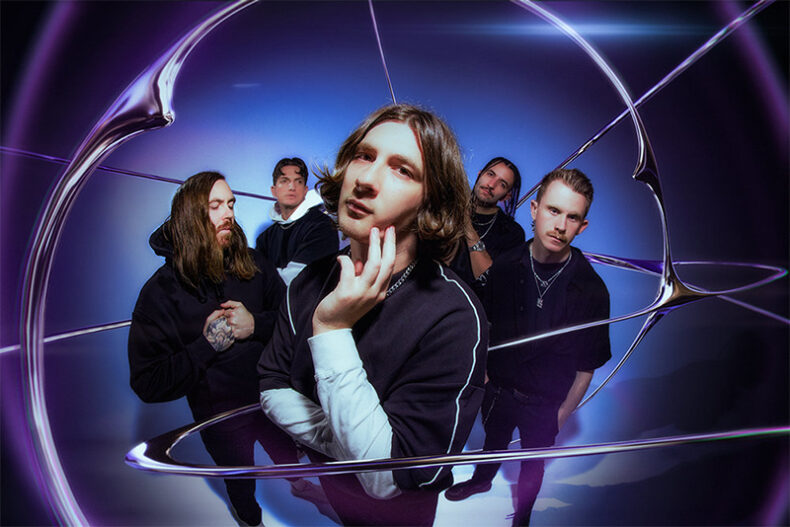PROGRESSING FORWARD
A CONVERSATION WITH WINDWAKER
With change comes risk and the unknown, sometimes yielding more fear than one knows and understands. For the Australian metalcore band Windwaker, this unknown concept fell upon them when a new vocalist and another new member would help continue the journey, which had barely begun to spread its wings in the scene. At the same time, former vocalist Will King sought to chase different dreams outside his musical aspirations. Such huge changes can make or break a band so new to the genre. But for new vocalist Liam Guinane and new member, keyboards, synthesizers, and programmer, Connor Robins, change was a welcome challenge, accented with a point to prove for their sophomore release. Love Language, their debut album, revealed an inventive and varied approach to the metalcore genre; however, their punchy, poignant, and timeless identity has continued to show that they are a band that stays loyal to their roots while constantly adding something new and exciting to their sound. In many respects, Windwaker has managed to fuse a quirky, nostalgic electronic vibe with incredibly layered instrumentals in the brief time they have been in the music business. Two years after their first release, Hyperviolence is a twisted combination of their sound that is inextricably linked to the very style they have been refining over time.
“I think it’s a time capsule of where we were at, pivoting from one vocalist to another, that vocalist being me, replies vocalist Liam Guinane. “This added a new dynamic, with Connor Robins joining the band too. “It’s something a lot more mature and focused than our previous album, Love Language. It was a balance between blending our individual identities and kind of getting reacquainted with everybody, for me at least, after so many years of being creatively apart and coming back together again. We learned a lot about each other and the way we work creatively.”
“I think the purpose of this album was to find a sound that we liked that was a little less chaotic,” adds bassist Indey Salvestro. “Even though I thought it was cohesive, we really tried to hone in on the ideas that worked on the last album, and the fact that we have two new members, particularly with Liam being the new vocalist, gave us a completely new writing dynamic. It’s a combination of learning from the first album and also delving into completely new territory because we had two new people. So, in that way, from a creative outlook, it was a fresh chemistry. Fundamentally, we’re just kind of a new band with two new members bringing in their influences.”
Such a fresh outlook would create a new darker, rebellious, and heavier sound. Hyperviolence shows a band very comfortable in their skin, with a reinvigorated zest that has blossomed within their songwriting while effortlessly displaying control in uncharted musical territory, yet underneath such control lies a wild and untamed spirit that permeates throughout each track. A different breed from their debut predecessor, Hyperviolence’s dissonance within its attitude and presence can be felt from beginning to end, as can its level of sonic maturity and experimentation.
“We already had a hip-hop influence with Will King. But Liam has a whole world of influence within the hip-hop world,” says Salvestro. “His predominant listening style is hip-hop. And Connor also brought more electronic, synth, and pop elements as well. So, we had a lot of tools at our disposal. We work in a creatively open space when we are away for these writing sessions that we do. We find that when we are together, we find we are inspired a lot more because we are constantly feeding off of each other. We often collaborate and go with the person with the strongest idea. There is not really an ego in the room.”
“The feeling at the start of writing this album compared to how it felt towards the end greatly changed for me,” says Guinane. “I think that’s sort of what this album is about—that sort of uncomfortability at first, and the pressure of everything that was set before me. But it was also equally very exciting. When we go to write albums, in the case of Love Language, we’ve gone away to writing retreats, we do that four or five times over a year, and like, living together. It was really exciting because there were points where we were working on the same song in three different rooms, tackling different aspects of it. You’d have Chris and Jesse working on the guitars, drums, and bass, and the structures around them, and me and Indey working on lyrics. Connor would be in another room working on the samples that the other two groups were doing, and we would all just put it all into one gumbo pot session. It was very free-for-all. Everyone was very open while also retaining a balance of everything that felt true to us because we all have such different influences. Therefore, we have a different set of skills for each person and different strengths that result in comfortability that’s happening when you are listening to it.”
With an album that came out as organically as it did, such curated chaos would dive into a complicated world of social unrest and an air of rebelliousness to the world surrounding them. Even while we live in a world that has all these parameters, Hyperviolence, through its instrumental risk and lyrical ingenuity, would prove that one doesn’t always have to give in to worldly pressures that divide and hold us back from social progress. One can always choose a different path than the one that is laid out in front of them if they so choose.
“I think we learned as a band many years ago not to get too personally attached to our ideas while also being open to criticism and being challenged by each other,” responds Guinane. “That’s something we encourage because that pushes us beyond what we think we are capable of ourselves. I think also the biggest difference with this album is how we chose to roll this one out compared to Love Language. The structure in which Love Language came out was a bit more traditional album release. It was a very quick succession, whereas with Hyperviolence we took our time to spread each single out to give its own time in the spotlight, so by the time the album came out we could grow our audience and have the most eyes surrounding it. That’s one big takeaway from this album. We wanted to create its own little journey before we got to the destination.”
“A takeaway we took out of this from a songwriting perspective was that during the Love Language cycle, we were very focused on kind of doing things left of field and trying to be different,” continues Salvestro. “Not in the complete sense of the album, but there were a lot of decision-making processes through that album in which we would go for the choice that was more left of field and what you would normally hear. In this album, we leaned into what worked rather than trying to do something different. Because we write so uniquely and our songs are all over the place anyway, leaning into what worked instead of trying to do something different really helped the songwriting process.”
Hyperviolence has been instrumental in their journey of personal growth and embracing one’s creative and unique identities. This profound acceptance has deeply influenced the thematic elements of the album. In a tumultuous world marked by constant change, diverging opinions, and relentless discord, Windwaker aspires for the message of acceptance and grace that permeated their creative process to resonate with a world in need of healing and a more promising path forward.
“I want people to take the broad amount of personalities that make up our society and realize that there is a balance,” says Guinane. “We might not always agree with each other all the time, but it’s all love. There has to be a better way to come together and progress forward. That’s the hardest part of it, societal noise and the conflicts that are happening on and offline. I want people to take the time to realize a level of acceptance that we have to have with people, even if we don’t agree with them. The only way forward is to have compassion.”
“There’s a lot of side-taking and not enough acknowledgment of different opinions, attitudes, and different ways of thinking,” continues Salvestro. ” I believe Liam’s emphasis on the album’s content reflects a battle between two different personalities. But in its essence, it’s basically how the world is working at the moment, that battle, and eventually realizing there needs to be an acceptance in order for us to progress forward.”












